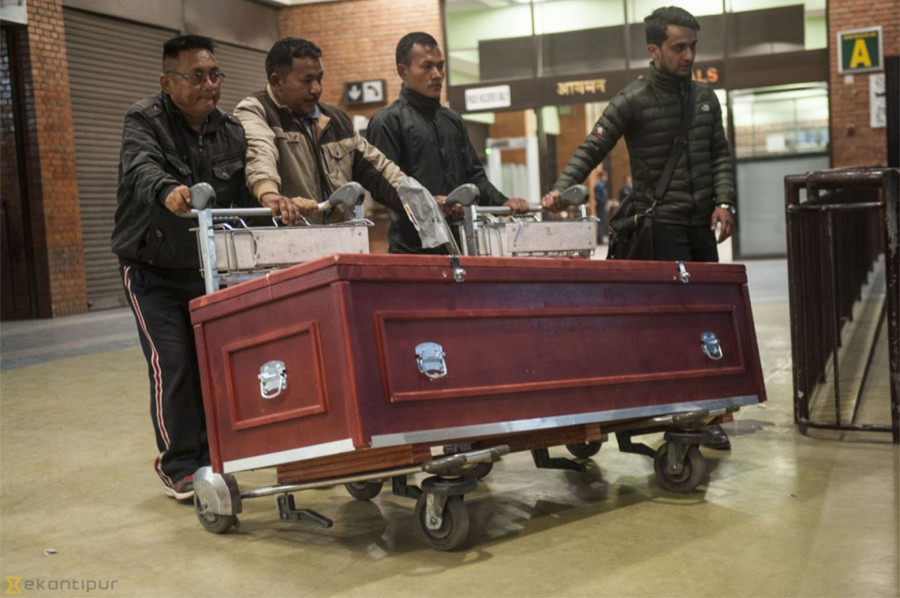Columns
Death without dignity
The government must arrange for the return of the remains of deceased migrant workers.
Anurag Devkota
Every day, about 1,500 workers fly out of Tribhuvan International Airport to labour destination countries and about three workers return in coffins. A government report states that 7,467 Nepali workers have died in their countries of employment between 2008 and 2019. The database is limited to information from relatives of deceased migrants who have requested compensation and does not fully capture all migrant deaths abroad—particularly those of undocumented migrant workers.
Before qualifying for employment in foreign countries, workers have to pass stringent medical exams which means they are of sound health when they leave. The causes of death of these workers have been listed as heart attack, heart disease, natural death, suicide, vehicular accident, workplace accident and murder. Beyond accidents and murder, most of these causes are chronic diseases which are very rare for a person who has passed stringent medical exams. Additionally, the data from 2009 to 2017 shows that 903 of the deaths (or 15.3 percent) were due to unidentified causes.
Due diligence
While the responsibility for ensuring a safe working environment also rests on the destination countries, the country of origin also has an important role to ensure that workers are protected from exploitation and potentially fatal workplaces. For example, it is the minimum responsibility of the Nepal government to perform a post-mortem of the deceased in order to understand the cause of death, whether a migrant worker or someone at home. An autopsy bears special significance as there are incidents where the cause mentioned by the destination countries has proven to be false. There are also several instances where an autopsy has revealed the theft of organs that are suspected to have been sold for transplantation on unknown beneficiaries.
The fact that most causes of deaths are unidentified or are attested without a post-mortem is a matter of grave concern. Section 20 of the Criminal Procedure (Code) Act 2017 provides that in case of death due to accident or suicide or a suspicious death within the territory of Nepal, the post-mortem of the deceased shall be done with all expenses paid by the government. It is evident that the government has excluded migrant workers from the protection offered by the law of their home country. The fact that the government is shying away from this responsibility towards migrant workers suggests an egregious disregard of its duty.
Far from establishing mechanisms to conduct post-mortems of migrant workers dying in the destination countries, the Nepal government has neglected the necessity to ensure easy and dignified return of the dead bodies. Tribhuvan International Airport, the only international airport in the country, does not even have a dedicated waiting room for the family and relatives of the deceased. Adding insult to injury, they have to carry the coffins of their loved ones by joining two luggage trolleys together. No part of this process hints at an ounce of dignity either towards the dead or their families.
There are also other easy and immediate steps that the concerned authorities can take to better prepare migrant workers for potentially hazardous working conditions abroad. The pre-departure orientation curriculum is outdated. The workers are taught about reproductive health and AIDS, but not about the factors that lead to the deaths of a large number of migrant workers—dehydration and traffic accidents. It is a right of every worker to be informed of the potential health hazards during foreign employment, and the government must update the curriculum so that workers are better equipped to deal with potential risks to their health.
Court ruling
Against these realities, the Supreme Court has ordered the government to take the necessary steps to minimise the risk of death of Nepali migrant workers. The court has mandated the government to clearly indicate the provisions regarding minimisation of the risk of death, conduct a compulsory post-mortem in case of death of migrant workers in the destination countries, inform the family of the deceased about the cause of death, facilitate easy and dignified transportation of the dead body, and insert insurance and compensation provisions in the bilateral and multilateral labour agreements signed with the destination countries.
The court directed the responsible authorities (the ministry, department and board) to make the necessary amendments and improve the orientation syllabus to reduce the health hazards of workers. It has also asked the government to form procedures regarding the retrieval of dead bodies of migrant workers as per international standards. This judgment is a benchmark in terms of protecting and preserving the rights of Nepali migrant workers in recent times.
The court also directed the government to collaborate with the concerned stakeholders to investigate and find out if it is essential to be a party to the Convention on the Right of Migrant Workers and their Families 1990 and make the necessary preparations to be a party to the convention. Being a party to the convention would put further pressure on the government to take the necessary actions. However, the implementation of the court order has not been encouraging. It is the responsibility of the concerned stakeholders—migrant rights activists, human rights activists, civil society and the media—to put persistent pressure on the government to ensure that the court orders are implemented.




 9.17°C Kathmandu
9.17°C Kathmandu















